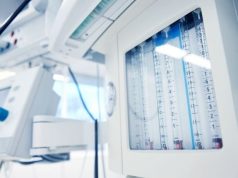Patients with abnormal chest CT had worse overall survival, nonrelapse mortality, pulmonary-related death
By Elana Gotkine HealthDay Reporter
FRIDAY, Feb. 24, 2023 (HealthDay News) — Pretransplant screening chest computed tomography (CT) is beneficial for identifying abnormalities before allogenic hematopoietic stem cell transplant (alloHSCT), according to a study published online Feb. 3 in Transplantation and Cellular Therapy.
Mohammad Alhomoud, M.D., from New York-Presbyterian Hospital/Weill Cornell Medicine in New York City, and colleagues characterized the prevalence of abnormalities on chest CT and explored their impact on alloHSCT eligibility and outcomes posttransplant in a retrospective analysis of 511 adult patients.
The researchers found that 199 patients (39 percent) had abnormal screening chest CT. The most frequently detected abnormalities included pulmonary nodule, consolidation, ground-glass opacification, bronchitis and bronchiolitis, pleural effusions, and new primary cancer (found in 35, 19, 15, 11, 6, and 2 percent, respectively). In 48 percent of the patients with abnormal chest CT, chest X-ray detected abnormalities. Forty-nine percent of the patients with abnormal chest CT underwent further assessment and/or intervention before transplant, with pulmonary consultation and infectious diseases consultation the most common work-ups (32 and 24 percent, respectively). Compared with those with normal chest CT, patients with abnormal chest CT had significantly worse overall survival, nonrelapse mortality, and pulmonary-related death.
“Screening chest CT is frequently beneficial in uncovering significant lung pathologies, with therapeutic implications,” the authors write. “Pretransplant screening chest CT can be reasonably considered as part of the routine pretransplant evaluation and appears considerably more sensitive than chest X-ray in this setting.”
Abstract/Full Text (subscription or payment may be required)
Copyright © 2023 HealthDay. All rights reserved.








